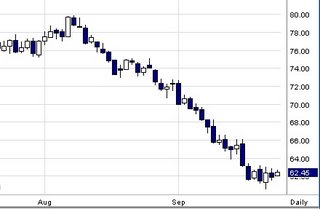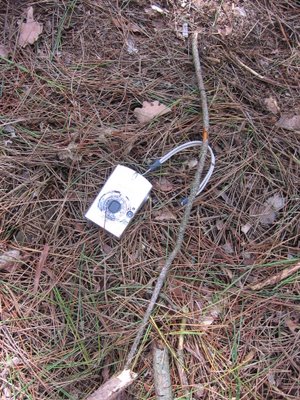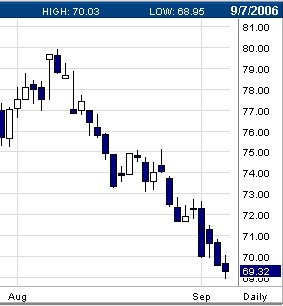
We optioned the cabin today, adding it to our "holdings"
Get-away, and Shirley get's her studio
Just a few details to wrap up
"History is a wonderful thing, if only it was true"
-Tolstoy
Actor Tom Cruise cannot be taken seriously after jumping on Oprah Winfrey’s couch and making a fool of himself.
California Attorney General Bill Lockyer is doing the same for his state’s legitimacy as a world leader in emissions regulation. His undoing is not a couch, but a frivolous new lawsuit against the six largest U.S. auto makers that even his home state’s Los Angeles Times calls “kooky.”
Lockyer, a Democrat running for state treasurer, contends that vehicle emissions, even legal emissions, are an illegal public nuisance that are partly responsible for California wildfires, flooding and a host of other maladies – even poor skiing conditions. His lawsuit seeks monetary damages from auto makers to address these alleged harms.
The basis of the suit goes like this: Global warming is linked to problems that are costing California billions. Cars and trucks emit carbon dioxide, which is a global-warming gas. General Motors, Ford, DaimlerChrysler, Toyota, Honda and Nissan sell most of the vehicles in California, so they now have to pay restitution for the havoc their tailpipe exhaust is wreaking on the state.
Major global auto makers such as Volkswagen, BMW, PSA and Fiat are not mentioned in the lawsuit. Neither are coal-fired powerplants in China.
Apparently because all politics is local, in Lockyer’s world, the earth’s atmosphere is local, too.
Already there are calls in Detroit and elsewhere to give Lockyer a taste of his own medicine. Some suggest the attorneys general of the 25 states poisoned by tainted spinach sue California farmers, or sue the major movie studios for contributing to the culture of violence plaguing American cities.
Certainly most Americans would join a class-action suit to get their money back for Gigli.
But when we’re through with all the silliness, a real problem remains: For almost four decades California has earned the grudging respect of the global auto industry by using its status as the U.S.’ largest single vehicle market to force new emissions technology with the most stringent regulations technically possible.
California now is squandering that respect by furthering the notion in the auto industry that it no longer is interested in using science to set rigorous standards for clean air and is instead simply pursuing an extreme political agenda.
If the frivolous lawsuits continue, auto makers will give up trying to meet emissions with technical innovation and will respond solely through legal channels. They will argue California’s regulations no longer are rational, let alone achievable.
MEDIA COVERAGE OF CLIMATE CHANGE:
Many in the media, as I noted earlier, have taken it upon themselves to drop all pretense of balance on global warming and instead become committed advocates for the issue.
Here is a quote from Newsweek magazine:
“There are ominous signs that the Earth’s weather patterns have begun to change dramatically and that these changes may portend a drastic decline in food production– with serious political implications for just about every nation on Earth.”
A headline in the New York Times reads: “Climate Changes Endanger World’s Food Output.” Here is a quote from Time Magazine:
“As they review the bizarre and unpredictable weather pattern of the past several years, a growing number of scientists are beginning to suspect that many seemingly contradictory meteorological fluctuations are actually part of a global climatic upheaval.”
All of this sounds very ominous. That is, until you realize that the three quotes I just read were from articles in 1975 editions of Newsweek Magazine and The New York Times, and Time Magazine in 1974. http://time-proxy.yaga.com/time/archive/printout/0,23657,944914,00.html
They weren’t referring to global warming; they were warning of a coming ice age.
Let me repeat, all three of those quotes were published in the 1970’s and warned of a coming ice age.
In addition to global cooling fears, Time Magazine has also reported on global warming. Here is an example:
“[Those] who claim that winters were harder when they were boys are quite right… weathermen have no doubt that the world at least for the time being is growing warmer.”
Before you think that this is just another example of the media promoting Vice President Gore’s movie, you need to know that the quote I just read you from Time Magazine was not a recent quote; it was from January 2, 1939.
Yes, in 1939. Nine years before Vice President Gore was born and over three decades before Time Magazine began hyping a coming ice age and almost five decades before they returned to hyping global warming.
Time Magazine in 1951 pointed to receding permafrost in Russia as proof that the planet was warming.
In 1952, the New York Times noted that the “trump card” of global warming “has been the melting glaciers.”
Congress06
2006 US Congressional Control Market

This graph is also available in flash format with the datapoints annotated, or in a simple jpg format.
US economy
Sep 21st 2006
From The Economist print edition
Back in the 1990s, when Democrats last had any power in Washington, the party was run by economic centrists. Bill Clinton and his crowd believed in free trade and free markets. They were friendly to business and wary of unions. The centrists' creed was that government should not interfere with the market, but help workers cope with the consequences.
Judging by the political rhetoric of the mid-term election campaigns, that centrism has all but disappeared. As they rail against America's growing income inequality and the stagnation of many workers' wages, the Democrats have tilted clearly to the left. Gone is the firm defence of globalisation. In its place is a new populism, based on bashing business, boosting the unions and meddling with markets."
I know I've crossed the generation gap when my editor at Slate does a wry takedown of a guy who's supposed to be the voice of his generation, and I have no idea who Zach Braff is. I've come to accept that every time I hear "Such Great Heights" it reminds me of Paul McCartney and Wings, and it's ok to have younger friends who think Garden State was brilliant because it was the first movie ever that used a lot of cool songs in the soundtrack."
Huh?
Benedict the Brave
September 19, 2006; Page A20
It's a familiar spectacle: furious demands for an apology, threats, riots, violence. Anything can trigger so-called Muslim fury: a novel by a British-Indian writer, newspaper cartoons in a small Nordic country or, this past week, a talk on theology by the head of the Roman Catholic Church.
In a lecture on "Faith and Reason" at the University of Regensburg in Germany, Benedict XVI cited one of the last emperors of Byzantium, Manuel II Paleologus. Stressing the 14th-century emperor's "startling brusqueness," the pope quoted him as saying: "Show me just what Mohammed brought that was new, and there you will find things only evil and inhuman, such as his command to spread by the sword the faith he preached."
Taken alone, these are strong words. However, the pope didn't endorse the comment that he twice emphasized was not his own. No matter. As with Salman Rushdie's "Satanic Verses," which millions of outraged Muslims didn't bother to read (including Ayatollah Khomeini, who put the bounty on the novelist's life), what Benedict XVI meant or even said isn't the issue. Once again, many Muslim leaders are inciting their faithful against perceived slights and trying to proscribe how free societies discuss one of the world's major religions.
Several Iraqi terrorist groups called for attacks on the Vatican. A cleric linked to Somalia's ruling Islamist movement urged Muslims to "hunt down" and kill the pope. In an apparently linked attack Sunday in Mogadishu, a nun was gunned down in a children's hospital. Pakistan's parliament unanimously adopted a resolution condemning the pontiff and demanding an apology.
Under pressure and no doubt to stop any further violence, the pope on Sunday did so. "I am deeply sorry for the reactions in some countries to a few passages of my address . . . which were considered offensive to the sensibility of Muslims," he told pilgrims at his Castelgandolfo summer residence. The quote doesn't "in any way express my personal thought. I hope this serves to appease hearts."
It was a gracious gesture on the pope's part, especially because his original argument deserves to be heard, not least by Muslims. The offending quotation was a small part in a chain of argument that led to his main thesis about the close relationship between reason and belief. Without the right balance between the two, the pontiff said, mankind is condemned to the "pathologies and life-threatening diseases associated with religion and reason" -- in short, political and religious fanaticism.
In Christianity, God is inseparable from reason. "In the beginning was the Word," the pope quotes from the Gospel according to John. "God acts with logos. Logos means both reason and word," he explained. "The inner rapprochement between Biblical faith and Greek philosophical inquiry was an event of decisive importance not only from the standpoint of history of religions, but also from that of world history. . . . This convergence, with the subsequent addition of the Roman heritage, created Europe."
The question raised by the pope is whether this convergence has taken place in Islam as well. He quotes the Lebanese Catholic theologist Theodore Khoury, who said that "for Muslim teaching, God is absolutely transcendent, his will is not bound up with any of our categories." If this is true, can there be dialogue at all between Islam and the West? For the pope, the precondition for any meaningful interfaith discussions is a religion tempered by reason: "It is to this great logos, to this breadth of reason, that we invite our partners in the dialogue of cultures," he concluded.
This is not an invitation to the usual feel-good interfaith round-tables. It is a request for dialogue with one condition -- that everyone at the table reject the irrationality of religiously motivated violence. The pope isn't condemning Islam; he is inviting it to join rather than reject the modern world.
By their reaction to the pope's speech, some Muslim leaders showed again that Islam has a problem with modernity that is going to have to be solved by a debate within Islam. The day Muslims condemn Islamic terror with the same vehemence they condemn those who criticize Islam, an attempt at dialogue -- and at improving relations between the Western and Islamic worlds -- can begin.






The 56 companies hold leases that allow them to extract billions of dollars in oil and gas from the Gulf of Mexico without paying any royalties, regardless of how high energy prices or the industry’s profits might climb."
Dumb contract, questionable remedies.
"In what has now become a major scandal, the Interior Department inadvertently signed 1,100 drilling leases in the late 1990’s that offered lucrative incentives to deepwater drillers, regardless of how high energy prices might climb.
Officials then covered up the mistake for nearly six years. In that time, the prices for oil and gas soared and the magnitude of the potential loss to taxpayers escalated to more than $10 billion."
Plenty of blame to share...


Many magazines published speculative and unsupported articles--on an almost daily basis--regarding the baby's gender, and some reported rumors about arguments within the Imperial household over the issue of Imperial succession."

The U.S. military has long sought diesel-electric hybrids that would improve fuel economy, offer a reduced logistical burden and provide the ability to export power, among other advantages.
But after more than a decade of research and development, and despite much recent hype, military hybrids are still years away from mass production.
None of the current military hybrid engine efforts has any specific goals or timelines to deliver an operational vehicle. “Right now, we do not have a current hybrid program that targets fielding,” says Gus Khalil, team leader of hybrid-electric research at the Army’s Tank Automotive Research, Development and Engineering Center, or TARDEC.
But there is potential for civilian uses... note that garbage trucks have frequent stops, and could use regenerative braking.Oshkosh has pinned its hopes on the development of a hybrid drive for the heavy expanded mobility tactical truck, or HEMTT. The technology is jointly funded by Oshkosh, the Army and the Energy Department, which is interested in commercial and civilian applications of large hybrids, such as municipal garbage collection.
The Army uses the HEMTT for heavy cargo hauling. The hybrid HEMTT, which Oshkosh calls the A3, uses ultra-capacitors, rather than batteries, to store diesel-generated AC power, an adaptation that effectively skirts the problem that doomed the hybrid Humvee. Ultra-capacitors are safer and more efficient than batteries, company officials said, but store less energy per unit of weight than batteries and are more complex.
“When we’re coasting to a slower speed, when we have ‘regenerative braking,’ the rolling of the truck turns traction motors into generators, says Gary Schmiedel, Oshkosh vice president for advanced products. The ultra-capacitors can store 1.5 mega-joules of energy that way, he notes. “With that energy, I can add 190 horsepower to the truck for 10 seconds or 19 horsepower for 100 seconds. That saves fuel."